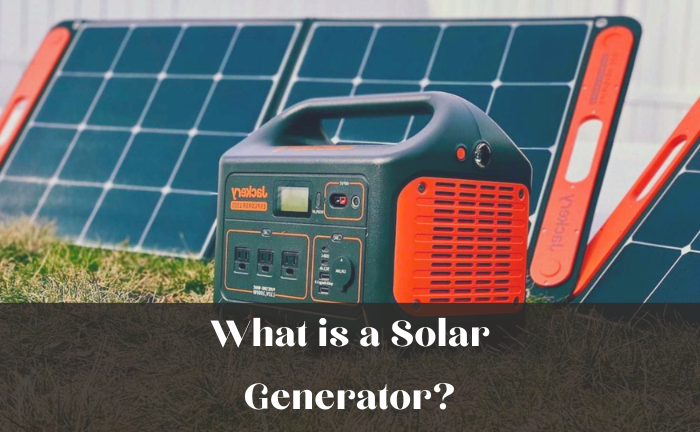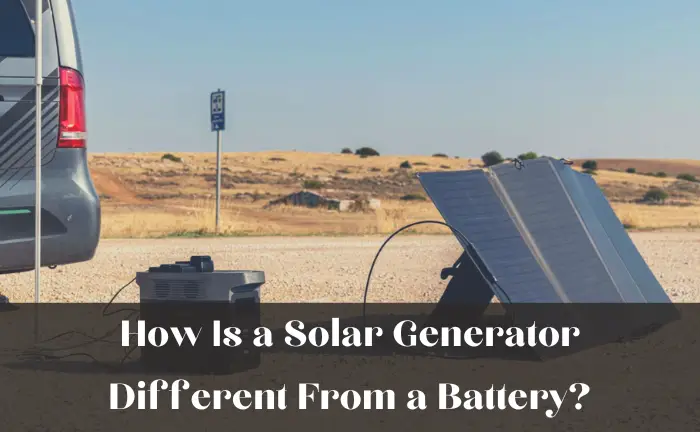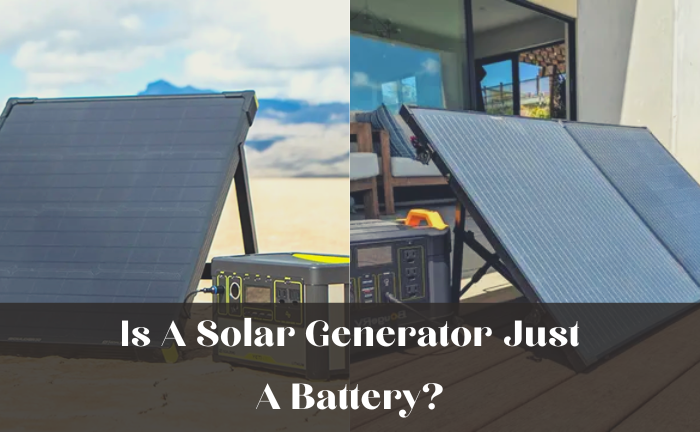Nowadays, every second household has a solar generator for power backup. I also prefer solar generators due to their reliability and clean working. I have heard many people believe that a solar generator is just a battery.
A solar generator is not just a battery. It contains various components to provide a power supply during a power outage. Meanwhile, a battery is a storage device that stores energy for backup.
In this article, I’ll walk you through the essentials of solar generators. Let’s delve in and explore more.
Table of Contents
What is a Solar Generator?

If you’re still confused about a battery and a solar generator, you must want to know more about solar generators. I’m here for your redemption.
A solar generator is a device that gets energy from the sun and converts it into electricity.
Solar Generators are being utilized as a source of energy for camping, outdoor activities, and even during power outages. It works with the combination of a few components. These include.
- Solar panels
- A battery
- Inverter
- Charge controller
All of these components will do their function for the appropriate work of the whole solar generator system.
How Does a Solar Generator Work?
By now, you understood what a solar generator is. Let’s move along to see how it works. Here you go.
- First of all, the solar panels will get solar energy from the sun and convert it into DC electricity.
- This DC electricity will pass through the charging controller.
- You might not know that the charge controller will assess the electricity voltage and then store the right portion of current in the battery.
- Whenever you need the backup power supply, the inverter will convert the DC into AC electricity and pass it to your appliances.
Here you’ll be able to run your essentials during a power outage.
Advantages Of A Solar Generator
The benefits of using a solar generator are given below.
Portable
One of the best advantages that I have found is solar generators’ portability. Whether you want a home backup or want an electricity supply in your camps, solar generators are perfect for you. It is lighter than the other gas generators.
So, you can easily move and grab your solar generator with you wherever you want. Some of the tiny generators can also be carried like your luggage.
Clean Renewable Energy
I chose a solar generator for my household due to its clean renewable energy. Like traditional generators, a solar generator doesn’t work on gasoline. So, there will be no emission of harmful gases.
Solar generators work on clean solar energy through the sun. Hence, you can sleep peacefully without worrying about the environmental impacts of toxic gases.
Low Maintenance
I was hell tired of repairing broken parts of my previous gas generator. Many of you might be feeling the same. If yes, move to the solar generator now. A solar generator doesn’t contain any moving parts so there’ll be no hassle of repairing the torn parts.
It will save your time and also save your money from purchasing replacements every time.
Free Fuel
If you’re tired of fuel expenses, cheer up. As you know, solar generators take energy directly from the sun and convert it into electricity. So, there will be no need to refuel your generator daily. The absence of fuel will also save you from continuous cleaning of dust and gasoline extracts.
Easy To Operate
Another thing that makes solar generators a perfect choice is their easy operation. You don’t have to fuel, accelerate, oil, or maintain your solar generator. All you have to do is turn on the generator and connect your desired devices. You’re ready to grab backup electricity to run your appliances.
Disadvantages Of A Solar Generator
Here are a few drawbacks of solar generators.
Limited Power Supply
One disadvantage that I have encountered in my solar generator is a limited power supply. Your solar generator will take energy from the sun and save it for later use. But the storage of power depends upon the size of the battery.
Solar generators are capable of running your low voltage appliances such as charging your laptop and phones, lighting up the bulbs, etc. But a solar generator can not run your whole house.
High Upfront Cost
Indeed, solar generators don’t cost fuel and maintenance charges. But you must know that solar generators always demand initial investment. The price of solar generators is 2X as compared to traditional gas generators.
If you want a solar generator you’ll have to spend a big amount although you can gain it by using it lifetime.
Slow Recharging
Solar generators recharge and store energy from the sun through solar panels. You should know that a solar generator will take approx 24 hrs to complete charging. The time can also be exceeded in bad or cloudy weather.
So, you have to make sure the battery is fully charged before relying on a solar generator as an emergency option.
How Is a Solar Generator Different From a Battery?

If you’re still stuck on the same question, what makes a solar generator different from a battery, don’t worry. Let me make it more understandable for you by comparing both of them.
| Parameter | Solar Generator | Battery |
| Power Source | A solar generator takes energy from the sunlight via solar panels and converts it into electricity. | A battery can be charged from an external source such as a wall outlet. |
| Capacity | It can save a minimum amount of energy. | It can store a huge amount of energy. |
| Portability | Solar Generators are portable and can be easily moved. | Batteries are usually stationary. |
| Cost | It is expensive because it requires solar panels to generate electricity. | It is less expensive and can be easily charged from a wall outlet. |
Conclusion
As a result, I would like to add that the generator and battery both are used for power backup. By now, you have a detailed guide about the difference between solar generators and a battery.
I have given you the pros and cons of using a solar generator in the above writing. You have also got a tabular comparison between a battery and a solar generator. Hopefully, you’ll not believe any myth regarding solar generators as just a battery.

